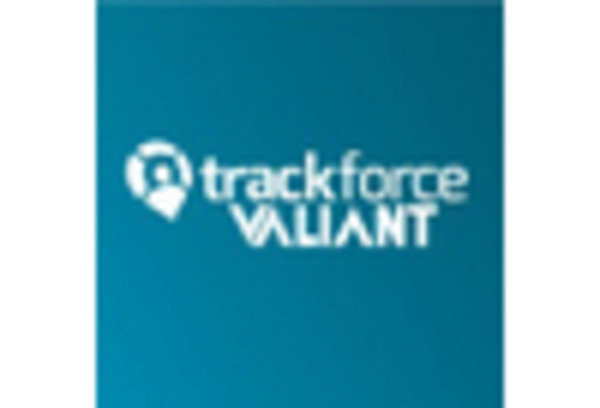Advancements in Technology
Technological advancements are playing a crucial role in shaping the Asset Tracking Software Market. The integration of technologies such as RFID, GPS, and barcoding has revolutionized asset management practices. These innovations enable organizations to track assets with unprecedented accuracy and efficiency. For example, the use of RFID technology can improve asset tracking accuracy to over 95%, significantly reducing losses and misplacements. Furthermore, as technology continues to evolve, the capabilities of asset tracking software are expected to expand, offering features such as predictive analytics and automated reporting. This continuous technological evolution is likely to drive further adoption within the Asset Tracking Software Market.
Growing Adoption of Mobile Solutions
The proliferation of mobile technology is significantly influencing the Asset Tracking Software Market. Organizations are increasingly adopting mobile solutions to enhance asset tracking capabilities, allowing employees to access real-time data from anywhere. This shift towards mobile-enabled asset tracking solutions is driven by the need for flexibility and responsiveness in asset management. Recent market analysis suggests that mobile asset tracking solutions can improve asset utilization rates by up to 25%. As businesses continue to embrace mobile technology, the Asset Tracking Software Market is likely to experience accelerated growth, driven by the demand for mobile accessibility and convenience.
Rising Need for Supply Chain Visibility
The Asset Tracking Software Market is witnessing a heightened focus on supply chain visibility. As businesses increasingly operate in complex supply chains, the need for real-time tracking of assets throughout the supply chain has become critical. Companies are leveraging asset tracking solutions to gain insights into the location and status of their assets, which can lead to improved decision-making and reduced lead times. Recent studies indicate that organizations with enhanced supply chain visibility can experience a 20% increase in operational performance. This growing need for transparency and efficiency in supply chains is expected to drive the expansion of the Asset Tracking Software Market.
Regulatory Compliance and Risk Management
In the Asset Tracking Software Market, the growing emphasis on regulatory compliance is a significant driver. Organizations are increasingly required to adhere to stringent regulations regarding asset management, particularly in sectors such as healthcare and finance. The implementation of asset tracking solutions aids in maintaining compliance by providing accurate records and facilitating audits. For instance, the healthcare sector has seen a rise in the adoption of asset tracking software to comply with regulations related to medical equipment management. This trend not only mitigates risks associated with non-compliance but also enhances overall operational integrity, thereby propelling the growth of the Asset Tracking Software Market.
Increasing Demand for Operational Efficiency
The Asset Tracking Software Market is experiencing a notable surge in demand as organizations strive for enhanced operational efficiency. Companies are increasingly recognizing the value of real-time asset visibility, which allows for better resource allocation and reduced operational costs. According to recent data, businesses that implement asset tracking solutions can achieve up to a 30% reduction in asset-related expenses. This trend is particularly evident in sectors such as manufacturing and logistics, where the need for precise inventory management and equipment tracking is paramount. As organizations continue to seek ways to streamline operations, the Asset Tracking Software Market is likely to see sustained growth driven by this demand for efficiency.















